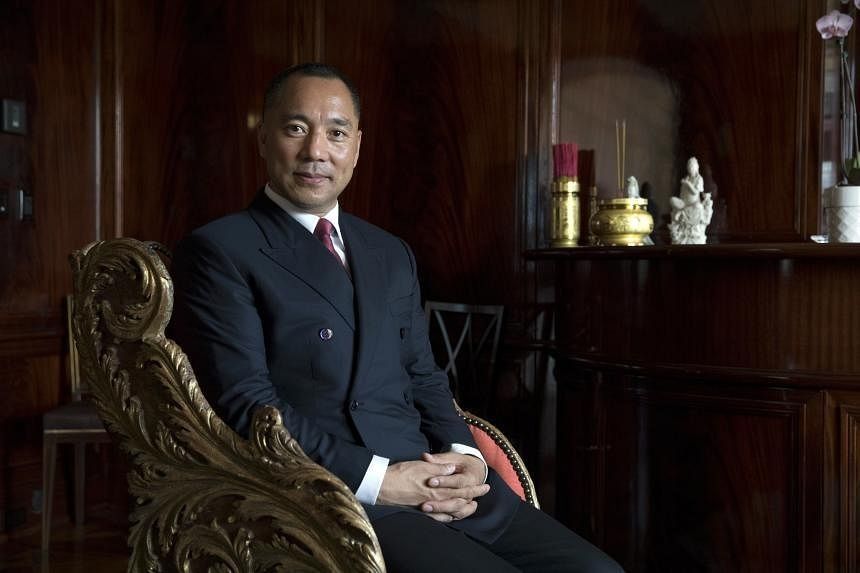
SINGAPORE: The man behind a network of 95 accounts that the authorities have ordered to be blocked in Singapore under the Foreign Interference (Countermeasures) Act, or Fica, was once a property mogul.
Guo Wengui (pic), who also goes by Miles Guo, Ho Wan Kwok and various other names, left China in 2014 and fled to the United States, where he gained a following as a Chinese government critic. On Wednesday July 17, he was convicted of defrauding his online followers of US$1 billion (S$1.34 billion).
The Straits Times looks at his rise and fall.
Origins and rise in China
Guo was born into poverty in the 1970s in Shandong province, according to various profiles of him published in Western media. He spent some time in jail but later rose to control a property empire, becoming China’s 74th richest person by 2014.
Throughout his career, he cultivated a relationship with a Chinese senior intelligence official – Ma Jian – the nature of which both men have made conflicting statements on at various times.
ALSO READ: Singapore orders Facebook, X to block Chinese tycoon Guo’s posts
Ma, who was vice-minister at the Ministry of State Security, was subsequently investigated for corruption, with the Chinese authorities stating that he had used his position to further Guo’s business interests in exchange for bribes.
Chinese officials also accused Guo of bribery, money laundering and other crimes, which he denied.
Guo fled the country, ending up in New York. Ma was later jailed for life.
Anti-Communist critic with links to US political right
After arriving in the US to seek political asylum, Guo made a name for himself on social media, painting a picture of himself as an anti-Communist Party of China (CPC) whistle-blower with insider knowledge on corruption in the state.
He bought a penthouse in the luxurious Sherry-Netherland building in Manhattan’s Fifth Avenue for a reported US$67.5 million.
In April 2017, Interpol issued a “red notice” for his arrest at Beijing’s request.
ALSO READ: Chinese tycoon guilty in US of US$1bil investor fraud
Meanwhile, Guo met and established links with American right-wing figures such as former president Donald Trump’s one-time chief strategist Steve Bannon, even becoming a member of Mar-a-Lago, Trump’s Florida club.
Guo and Bannon began working together, uniting over a shared enemy: the CPC. Guo told The New York Times in a 2018 interview: “We both naturally despise the Chinese Communist Party. That’s why we’ve become partners.”
That year, the pair announced plans for a US$100 million fund to investigate corruption and aid people whom they deemed victims of Chinese government persecution.
In 2020, they announced the New Federal State of China, a group claiming to be a Chinese government-in-exile.
At a ceremony in New York to mark the birth of the organisation, Guo marked a declaration of its principles in his own blood.
Arrest, conviction and web of disinformation
Guo used his influence and prominence as an anti-CPC critic to grow an online following, amplified by his own social media operation.
A 2021 analysis by social media analytics firm Graphika titled Ants In A Web found that Guo was at the centre of a network of thousands of social media accounts used to spread disinformation and harass his opponents.
He eventually ran afoul of the law in the US and was arrested in 2023 on grounds that he had fleeced many of his followers.
During the trial, prosecutors said Guo and his associates raised more than US$400 million from 5,500 investors in 2020 through an illegal private stock offering related to his company GTV Media Group.
Guo then diverted US$100 million from this fund and placed it in a high-risk hedge fund, they said.
He also skimmed money off various other funds, using the cash to fund his lavish lifestyle,which included purchases such as a US$37 million yacht, a mansion in New Jersey, several luxury cars and other extravagant goods, including two US$36,000 mattresses.
Assistant US Attorney Micah Fergenson said during the trial: “Miles Guo ran a simple con on a grand scale. He lived a billionaire’s lifestyle using money he stole from people he tricked and cheated.”
The case concluded on July 17, 2024, and Guo was found guilty of conducting fraud to the tune of US$1 billion.
The New York court found that he had told “investors” that they were funding business ventures, including a media company, a membership service and a new cryptocurrency, but he had instead used the money to fund his own lifestyle.
He will be sentenced later in 2024 and faces decades in jail. - The Straits Times/ANN










































